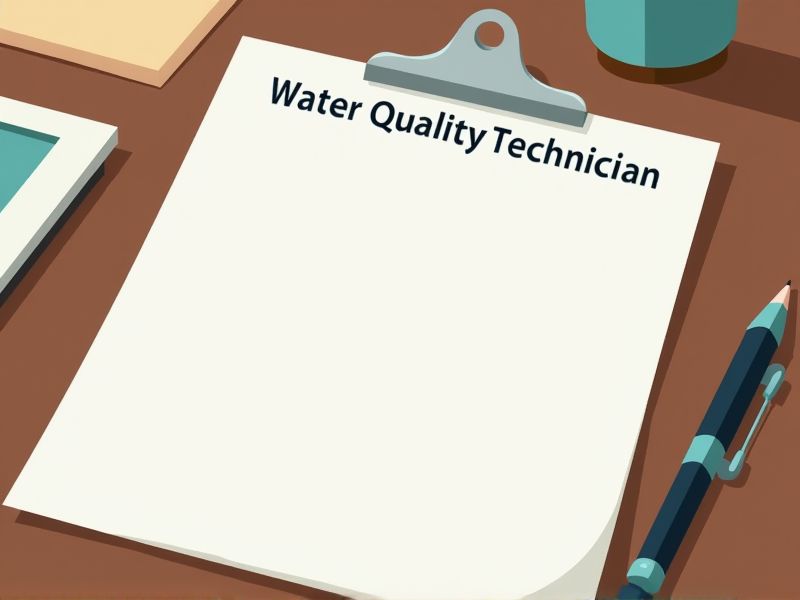
Water Quality Technicians play a crucial role in ensuring the safety and health of public water systems. Their work requires precise skill and adherence to regulatory standards to minimize risks associated with waterborne contaminants. Certifications validate a technician's expertise in handling equipment, conducting tests, and interpreting results accurately. Essential certifications for a Water Quality Technician include those focused on water analysis and regulatory compliance.
Certified Water Quality Technician (CWQT)
A Certified Water Quality Technician (CWQT) is vital because certification ensures that the individual has met the recognized standards of competence and knowledge in water quality management. It leads to improved public trust, as water safety is a critical health issue, requiring qualified professionals to handle its management. The credential helps in standardizing practices across the field, which reduces errors and enhances the efficiency of water quality assessments. The certification also often results in better career opportunities and job security for technicians, as employers prefer certified experts who can reliably ensure compliance with regulations.
Certified Drinking Water Operator (CDWO)
Certified Drinking Water Operators (CDWOs) are essential because they ensure the safe treatment and distribution of potable water, directly influencing public health. The presence of CDWOs reduces the risk of waterborne diseases by maintaining regulatory compliance and monitoring water quality parameters. Their expertise in diagnosing and troubleshooting water systems enhances the efficiency and reliability of water supply infrastructures. CDWOs contribute to the sustainability of water resources by implementing best practices and optimizing resource utilization.
AWWA Certified Water Treatment Plant Operator
The expertise of an AWWA Certified Water Treatment Plant Operator ensures compliance with water quality standards, directly impacting the health and safety of communities. By possessing specialized knowledge in treatment processes, these operators optimize the operation and maintenance of water systems, reducing the risk of contamination. Their certification indicates proficiency in modern technologies and techniques essential for efficient water resource management. Properly trained operators are key in responding effectively to system failures, minimizing the consequences of waterborne issues.
HAZWOPER Certification
Water Quality Technicians often encounter hazardous substances during water testing and treatment, necessitating HAZWOPER Certification to ensure they can manage and respond to these risks safely. The certification equips them with the knowledge to implement proper safety protocols, reducing the chances of contamination or accidents. Legal requirements mandate that personnel involved in activities like hazardous waste cleanup and emergency response must obtain this certification, aligning with OSHA regulations. Adequate training fosters a safer work environment and enhances the technician's ability to address various environmental and safety challenges effectively.
OSHA Laboratory Safety Certification
OSHA Laboratory Safety Certification ensures Water Quality Technicians understand and implement safety protocols, reducing the risk of accidents or exposure to hazardous chemicals. Certification validates the technician's ability to maintain a safe work environment, crucial for accurate water sample analysis without contamination. Proper safety training helps in compliance with federal regulations, protecting both workers and the public from potential health risks. As laboratories often handle volatile or dangerous substances, certified technicians contribute to the overall safety and efficacy of water quality assessments.
Certified Environmental Technician (CET)
When a Certified Environmental Technician (CET) is involved in water quality work, their certification ensures a baseline level of expertise and industry best practices, which helps in accurate monitoring and assessment. The CET designation often involves up-to-date knowledge of environmental regulations, aiding in compliance with legal standards in water management. Their skills in using specialized equipment and conducting detailed analysis enhance the quality and reliability of water testing. The presence of a CET also contributes to risk reduction by identifying potential environmental hazards early in the process.
Certified Laboratory Analyst (CLA)
Having a Certified Laboratory Analyst (CLA) certification ensures a Water Quality Technician possesses validated skills and knowledge in analytical procedures and safety standards. Accurate water quality analysis is critical for public health, and certified analysts demonstrate proficiency in detecting and quantifying contaminants. Certification leads to enhanced trust among employers and stakeholders since it reflects adherence to industry regulations and best practices. Water environments are prone to complex challenges, and a CLA provides technicians with methodologies to address diverse water quality issues effectively.
Water Sampling and Analysis Certification (WSAC)
The Water Sampling and Analysis Certification (WSAC) ensures that a Water Quality Technician has the knowledge to perform water tests accurately, thereby maintaining public health standards. Technicians with this certification can effectively identify contaminants, preventing potential waterborne diseases. Certified technicians are more likely to follow legal and environmental regulations, ensuring compliance with safety standards. The certification also increases trust and credibility among employers and clients, as it validates the technician's skills in essential water analysis processes.
EPA Accredited Water Testing Certification
EPA Accredited Water Testing Certification ensures that a Water Quality Technician possesses the necessary skills and knowledge to accurately test and analyze water samples, directly affecting public health. This certification guarantees compliance with federal environmental standards, reducing the likelihood of violating regulations and facing potential legal consequences. With the certification, technicians can improve their ability to assess and address water pollution issues, enhancing overall environmental safety. Validating a technician's competency through this certification can increase trust and credibility among clients and stakeholders.
Quality Assurance/Quality Control (QA/QC) Certification for Environmental Laboratories
Quality Assurance/Quality Control (QA/QC) Certification ensures that water quality technicians adhere to standardized protocols, enhancing accuracy in environmental testing. By obtaining this certification, technicians demonstrate competence in handling complex equipment and interpreting data, which is critical for maintaining regulatory compliance. Errors in water quality testing can lead to severe public health risks, making QA/QC certification essential for credibility and trust. The certification also supports continuous improvement in laboratory practices, contributing to better environmental stewardship.
Summary
You, as a Water Quality Technician, can expect enhanced job opportunities when you achieve relevant certifications, as many employers prioritize qualified candidates. Earning certifications often leads to a higher salary, reflecting advanced skills and specialized knowledge. Certification can also increase your credibility and professional reputation among peers in the industry. This recognition opens doors for career progression, including potential leadership roles.
